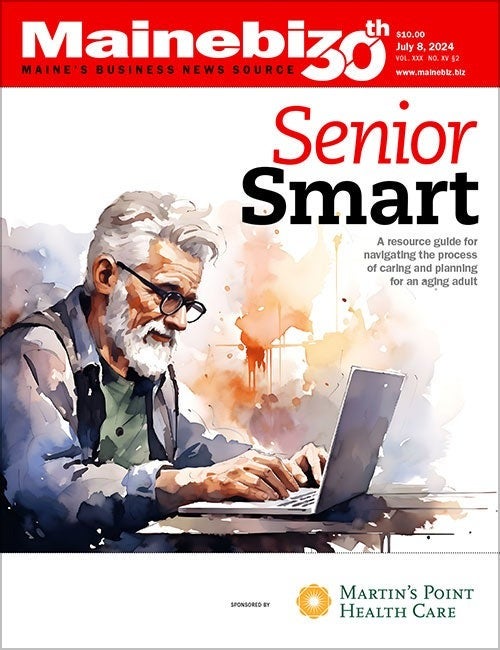Processing Your Payment
Please do not leave this page until complete. This can take a few moments.
- News
-
Editions
View Digital Editions
Biweekly Issues
- November 18, 2024
- November 4, 2024
- October 21, 2024
- October 7, 2024
- September 16, 2024
- September 2, 2024
- + More
Special Editions
- Lists
- Viewpoints
-
Our Events
Event Info
Award Honorees
- Calendar
- Biz Marketplace
Poll results
As reported in the Sept. 21 print edition of Mainebiz, the telehealth trend appears here to stay. The use of remote technology is allowing health care providers to help patients from outside the confines of a traditional office, clinic, hospital or other in-person medical setting. And in the age of COVID-19, that capability is more important than ever.
Telehealth is enabling access to services from emergency care to chronic care to behavioral health care. A McKinsey & Co. report showed that the percentage of U.S. consumers using telehealth has soared from 11% last year to 46% in May. Maine, with its large rural and elderly populations and a vigorous health care industry, may be poised to leverage continued growth.
As reported in the Sept. 21 print edition of Mainebiz, the telehealth trend appears here to stay. The use of remote technology is allowing health care providers to help patients from outside the confines of a traditional office, clinic, hospital or other in-person medical setting. And in the age of COVID-19, that capability is more important than ever.
Telehealth is enabling access to services from emergency care to chronic care to behavioral health care. A McKinsey & Co. report showed that the percentage of U.S. consumers using telehealth has soared from 11% last year to 46% in May. Maine, with its large rural and elderly populations and a vigorous health care industry, may be poised to leverage continued growth.
- 73 Votes
- 3 Comments
3 Comments
-
September 23, 2020
For issues that do not require an in person visit, I may never want to go into the doctor's office again. My doctor is an hour away, so this saves me two hours when I needed something from the doctor. Love telemedicine!!
-
September 23, 2020
For the elderly, who have most of the doctor's appointments, this a much safer and convenient way to have follow up appointments. This should have been the norm, but the medical providers were not being compensated in the same amount for telehealth versus in person visits. It was not about what was best for the patient, but what was most profitable. I hope that this trend continues.

The Giving Guide
The Giving Guide helps nonprofits have the opportunity to showcase and differentiate their organizations so that businesses better understand how they can contribute to a nonprofit’s mission and work.
Learn More
Work for ME
Work for ME is a workforce development tool to help Maine’s employers target Maine’s emerging workforce. Work for ME highlights each industry, its impact on Maine’s economy, the jobs available to entry-level workers, the training and education needed to get a career started.
Learn More
Senior Smart
Few people are adequately prepared for all the tasks involved in planning and providing care for aging family members. SeniorSmart provides an essential road map for navigating the process. This resource guide explores the myriad of care options and offers essential information on topics ranging from self-care to legal and financial preparedness.
Learn more-
The Giving Guide
The Giving Guide helps nonprofits have the opportunity to showcase and differentiate their organizations so that businesses better understand how they can contribute to a nonprofit’s mission and work.
-
Work for ME
Work for ME is a workforce development tool to help Maine’s employers target Maine’s emerging workforce. Work for ME highlights each industry, its impact on Maine’s economy, the jobs available to entry-level workers, the training and education needed to get a career started.
-
Senior Smart
Few people are adequately prepared for all the tasks involved in planning and providing care for aging family members. SeniorSmart provides an essential road map for navigating the process. This resource guide explores the myriad of care options and offers essential information on topics ranging from self-care to legal and financial preparedness.
ABOUT
NEW ENGLAND BUSINESS MEDIA SITES
No articles left
Get access now
In order to use this feature, we need some information from you. You can also login or register for a free account.
By clicking submit you are agreeing to our cookie usage and Privacy Policy
Already have an account? Login
Already have an account? Login
Want to create an account? Register
This website uses cookies to ensure you get the best experience on our website. Our privacy policy
To ensure the best experience on our website, articles cannot be read without allowing cookies. Please allow cookies to continue reading. Our privacy policy
I am a retired surgeon. Surgeons need to do physical exams for tumors and hernias and abdominal pain, etc. Post op they need to examine wounds and assess hernia repairs, etc. Telemedicine is fine in many but not all instances.